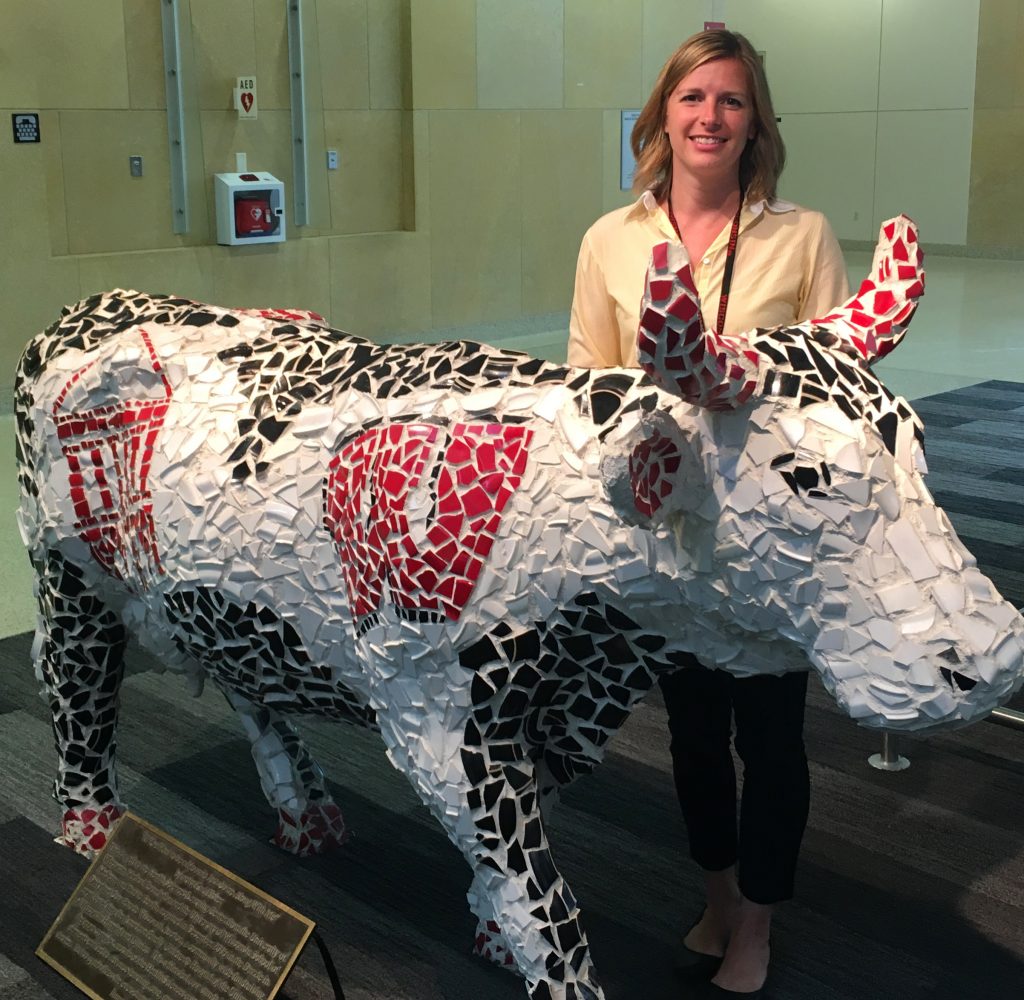
For Genetics fellow and Department of Pediatrics residency alumna Katie Williams, MD, PhD, a community health event during her last year of residency was the spark that launched her career.
That event, held October 10, 2012, at the Scenic Bluffs Community Health Center in Norwalk, Wisconsin—near one of Wisconsin’s more concentrated Amish settlements—featured an inspiring presentation from Holmes Morton, MD, who was there as part of a Department of Pediatrics visiting professorship.
Dr. Morton is a world-renowned pediatric genetic specialist and founder of the Strasburg, Pennsylvania-based Clinic for Special Children, which integrates genomic research and practical medical treatment for children with rare genetic disorders. The clinic provides care to over 1,100 patients from Pennsylvania’s Amish and Mennonite communities, 40 states and 17 countries.
Dr. Williams had first learned of the clinic during residency rotations at the Waisman Center. At the event in Norwalk, she was among approximately 400 attendees who heard Dr. Morton share ways to improve newborn screening and health care delivery for Wisconsin’s Amish and Mennonite population, also known as the Plain community. “It was really impressive to see how many people from the Plain community came out to hear him speak,” she reflects. “There was clearly a need for more people to help care for children with special needs, and it was inspiring to hear how they were providing that care at that clinic.”
From Residency to a Special Clinic in Pennsylvania
Dr. Williams’ love of science began during her childhood on a dairy farm in Kenosha County, Wisconsin. It continued as she earned an undergraduate degree in animal science and PhD in nutritional sciences, both from the University of Wisconsin-Madison, and a medical degree from the UW School of Medicine and Public Health.
As a resident, she recalls being fascinated by the biochemical processes and hormonal pathways that underlie disease, and how they can be demystified during the diagnostic process.
She was considering entering a genetics and/or endocrinology fellowship after residency, but then she heard Dr. Morton mention that his clinic was looking for a new physician.
“The work seemed to have many of the components I was looking for,” she remembers. “It combined basic science and rural healthcare in a truly unique medical model.”
So in October 2013, after residency graduation, Dr. Williams and her family relocated to Pennsylvania.
Comprehensive Care Rooted in the Community
At the Clinic for Special Children, Dr. Williams was among pediatricians, nurses, researchers and patient advocates who provide comprehensive care in a medical-home model.
She recalls the challenges and rewards of caring for children with significant medical needs, in a way that was mindful of cultural preferences as well as costs. (Most clinic patients do not have health insurance.)
“I had the opportunity to work with the Plain community in a very personal way. In many cases, I got to know the child and family well. At times, I watched that child thrive. Other times, the child passed on and we were there to support the family,” she reflects. “The relationships with the children and families were very important to me. I was so grateful to be part of their lives.”
Her work outside the clinic included a collaboration with a local cardiologist to develop a modified pulse oximetry screening protocol for babies delivered by midwives outside the hospital. She and her colleagues also developed workshops and continuing medical education courses to train midwives on the protocol and other medical issues that may emerge in the first weeks of life.
In addition, she contributed to several research projects: one on a common genetic mutation among local Amish that causes familial hyperlipidemia; one on the long-term health, organ function and neurocognitive outcomes of children with the rare metabolic disorder glutaric aciduria type 1; and one describing a previously unknown genetic disorder that causes severe multisystem disease.
Return to Service in Wisconsin
After more than four years at the clinic, she still loved her work, but wanted to broaden her skills and experience with genetic disorders.
Excited by the Department of Pediatrics’ continued commitment to the Wisconsin Plain Community Project, which in June 2017 was recognized with a UW-Madison Community-Academic Partnership award, she sought out our clinical medical genetics fellowship. The two-year program prepares physicians to provide comprehensive genetic diagnostic, management, therapeutic and counseling services.
In June, she returned to Wisconsin with her family, which had since grown to include three children, and in July, began her fellowship, again working alongside many of the faculty she trained with during residency.
“It’s great to be practicing in Wisconsin where there is a robust initiative to serve the Plain community,” she says. “I would love to take these two years to strengthen my clinical skills, and then find a way to reach children from the Plain community who don’t already have access to care.”